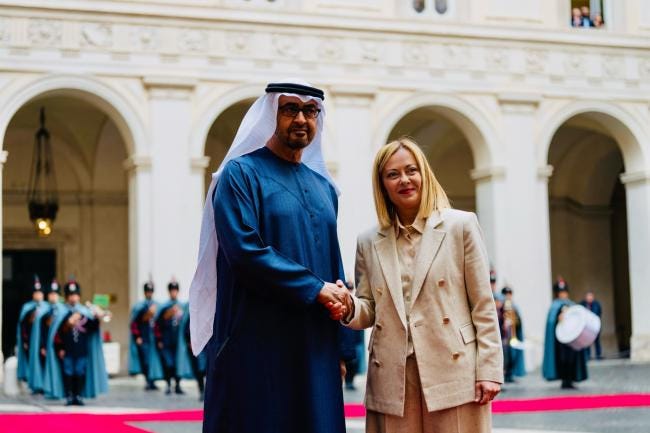UAE Doubles Down on IMEC with $40 Billion Italy Investment
As the broader Gulf is working to secure individual spots within global trade routes, the UAE is betting big on the IMEC.
Just before Ramadan began, the UAE pledged $40 billion in investments in Italy across various sectors, in addition to the signing of forty new bilateral agreements. The deals are expected to be the first steps towards a shared goal of a ‘Comprehensive Strategic Partnership’ between the two countries. Covering defense, energy, and artificial intelligence, they fall right in line with the broader Gulf’s partnership with Italy and the European Union at-large. At a time when Washington is breathing new life into the IMEC and regional resistance actors are ramping up efforts against it, the UAE appears to be doubling down on the vision.
Emirati IMEC Vision
Emirati-Italian ties have grown significantly in recent years, with Italian Prime Minister Meloni showing a particular focus on the Gulf state. Under her leadership, Italy lifted arms sales embargos on both the Emirates and Saudi Arabia in an effort to strengthen its own economy. In five years, Italy increased investment in the UAE by 50%. The expanding cooperation underscores Italy’s desire to secure a place in the Gulf’s post-oil future.
Meloni, who described the meeting as ‘historic’, welcomed the Emirati President on his first state visit to Italy this week to secure further strategic gains. The largest agreement, a $40 billion investment pledge, has no specified timeline but is intended to invest in key forward-looking sectors such as AI, technology, and space exploration. Major Italian companies were part of the meeting, with Eni signing an agreement with Emirati data companies MGX and G42, as well as energy firms Masdar and Taqa Transmission. The agreements aim to develop data centres in Italy and transmit gas as part of the recent Italy-Albania-UAE energy deal. Two space exploration agreements were also signed, in addition to agreements concerning industrial cooperation in the defence sector.
The Gulf’s EU Race
The UAE’s focus on Italy, and the EU more broadly, is largely due to its investment in the IMEC vision. Racing to strengthen relations with the European leg of the trade route, the final destination of the region’s vast energy reserves, is also part of the rivalry within the GCC. Each state is rushing to sign multi-billion dollar agreements, historically mostly with Western countries, to become ‘regional hubs’ for their non-oil future.
Last month, Saudi Arabia signed agreements worth a cumulative $10 billion with Italy. This followed major investments in the bloc’s green energy future. Moreover, Gulf-EU ties have been placed in the spotlight as an alternative to Russian energy relations. This week, the President of the Paris-based International Energy Agency called for European reconsideration of Russian gas and specifically urged the use of Qatari gas as a replacement by 2027.
That said, both Saudi Arabia and Qatar are showing pragmatism in light of recent geopolitical and technological shifts. Saudi swiftly invested in Chinese technology after the DeepSeek shock, and Qatar has maintained a graceful balance between China and India by announcing deals with both countries almost simultaneously. Abu Dhabi, on the other hand, has not displayed a desire to follow suit. Instead, it has doubled down on EU investments.




